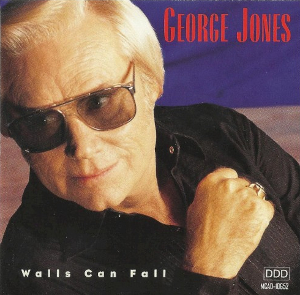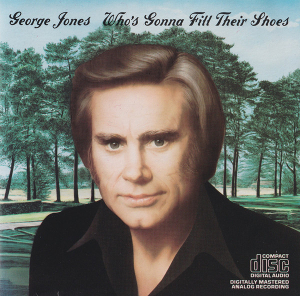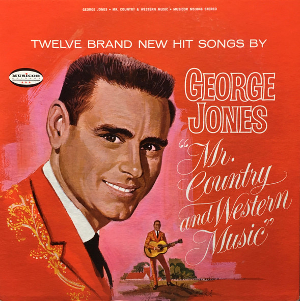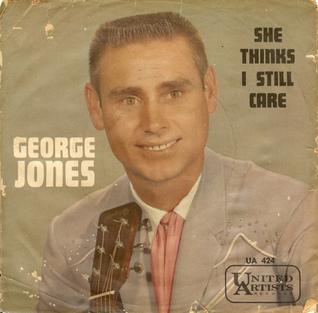
One Woman Man is an album by American country music artist George Jones, released on February 28, 1989 on Epic Records.

Walls Can Fall is an album by American country music artist George Jones. This album was released in 1992 on the MCA Nashville Records. It peaked at number 24 on the Billboard Country Albums chart and number 77 on The Billboard 200 chart. Walls Can Fall went Gold in 1994.

Who's Gonna Fill Their Shoes is the 45th studio album by American country music artist George Jones, released in 1985 on the Epic Records label.

A Picture of Me is an album by American country music singer George Jones. It was released in 1972 on the Epic Records label.

Mr. Country & Western Music is an album by American country music artist George Jones released in 1965 on the Musicor Records label.

"Why Baby Why" is a country music song co-written and originally recorded by George Jones. Released in late 1955 on Starday Records and produced by Starday co-founder and Jones' manager Pappy Daily, it peaked at 4 on the Billboard country charts that year. It was Jones' first chart single, following several unsuccessful singles released during the prior year on Starday.
"The Race Is On" is a song written by Don Rollins and made a hit on the country music charts by George Jones and on the pop and easy listening charts by the unrelated Jack Jones. George's version was the first single released from his 1965 album of the same name. Released as a single in September 1964, it peaked at number three on the Billboard Hot Country Singles chart and at number 96 on the Billboard Hot 100 in January 1965. Jack's version topped Billboard's Easy Listening chart and reached number 15 on the Hot 100 the same year. The two recordings combined to reach number 12 on the Cashbox charts, which combined all covers of the same song in one listing and thus gave George Jones his only top-40 hit. The song uses thoroughbred horse racing as the metaphor for the singer's romantic relationships.

"She Thinks I Still Care" is a country song written by Dickey Lee and Steve Duffy. The song was recorded by multiple artists, including George Jones, Connie Francis, Anne Murray, Elvis Presley and Patty Loveless.
"We're Gonna Hold On" is a 1973 duet single by George Jones and Tammy Wynette. The duo, who were a married couple at the time, had their first of three number-one songs on the U.S. country chart. "We're Gonna Hold On" was the most successful of these releases spending fourteen weeks on the chart. George Jones co-wrote the song with Earl Montgomery.
"The Window Up Above" is a song written and originally recorded by American country music artist George Jones. The version recorded by Jones peaked at number #2 on the country charts and spent a total of 34 weeks on the chart. It became a #1 smash for Mickey Gilley in 1975.
"Still Doin' Time" is a song written by John Moffatt and Michael P. Heeney, and recorded by American country music artist George Jones. It was released in September 1981 as the first single from the album Still the Same Ole Me. The song was Jones' eighth number one country single as a solo artist. The single stayed at number one for one week and spent a total of ten weeks on the chart. Much like his previous hit single, "If Drinkin' Don't Kill Me ," the song seemed torn from the pages of the singer's life; drug-addled and paranoid, he often disappeared for weeks on end, missing show dates and confounding his managers. "Still Doin' Time," with its story of a man who is a prisoner of alcohol who cannot escape, rang true to critics and fans, many of whom were astonished at how effectively Jones could sing despite his condition. Professionally, he was thriving; in November 1982 CBS Records extended his recording contract, and in December, he was nominated in the Playboy readers' poll as the year's best male vocalist in the country and Western category.
"Same Ole Me" is a song written by Paul Overstreet, and recorded by American country music artist George Jones with The Oak Ridge Boys. It was released in January 1982 as the second single and partial title track from Jones' album Still the Same Ole Me. The song reached number 5 on the Billboard Hot Country Singles chart and number 1 on the RPM Country Tracks chart in Canada.
"I Don't Need Your Rockin' Chair" is a song written by Billy Yates, Frank Dycus and Kerry Kurt Phillips, and recorded by George Jones. It was the first single from his 1992 album Walls Can Fall.
"Let's Invite Them Over" is a song written by Onie Wheeler, which was recorded as a duet by American country artists George Jones and Melba Montgomery. The song was released as the pair's second single in 1963.
"What Am I Worth" is a 1956 country music song released by George Jones, co-written by Jones and Darrell Edwards. The song was released on January 14, 1956 and was one of the fourteen songs included on Jones' debut album with Starday Records in 1957.
"You Gotta Be My Baby" is a song written and recorded by George Jones. It was his second Top 10 hit on Starday Records, peaking at #7 on the country singles chart. That same year, he sang "You Gotta Be My baby" at his first appearance on The Grand Ole Opry. According to Bob Allen's book George Jones: The Life and Times of a Honky Tonk Legend, Jones nearly walked off the Opry show when one of the WSM officials told him he could not take his guitar with him onstage but relented after Opry regular George Morgan handed him a guitar owned by Little Jimmy Dickens and promised he would take responsibility. In the video biography Same Ole Me, George recalled, "I was just so nervous. This was the biggest thing that could ever happen to anybody in the world and I was just shakin'. I mean just truly shakin' all over."
"Treasure of Love" is a song by George Jones. It was released as a single on Mercury Records and reached No. 6 on the US country chart in 1958.
"Right Won't Touch the Hand" is a ballad by American country singer George Jones. It was released on the Musicor label and rose to #7 on the Billboard country singles chart. It was written by Earl Montgomery. The recording, which features a lilting melody over an ambitious musical arrangement, was reminiscent of some of the material Elvis Presley was recording at the time. It would be one of the singer's last single releases on Musicor, for which he had recorded over 280 sides since 1965. Most of those records had been produced by H.W. "Pappy" Daily but, as recounted in Bob Allen's book George Jones: The Life and Times of a Honky Tonk Legend, by 1971 Jones had become unhappy with the uneven quality of his records under the supervision of Daily and Art Talmadge and, having been pried away from his longtime mentor Daily by wife Tammy Wynette, began seriously considering jumping ship to Epic Records so he could record with Wynette and her producer Billy Sherrill.
"I'll Follow You " is a song by George Jones. It was written by David Turner.
"Someday My Day Will Come" is a song by American country singer George Jones. It was released as a single by Epic Records in 1979 during a relative down period for the singer and, like several of his recent singles, failed to make the top 20, peaking at number 22.






